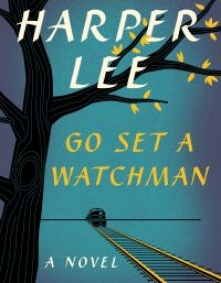LAW LINKS - August 2015
The Atticus Myth

By Christine Anne George
Archivist and Faculty Services Librarian at the Charles B. Sears Law Library
When I closed the book all I could do was sigh. For me it was a rather understated reaction. It could have been due to exhaustion—I was sitting in the Barnes and Noble parking lot by 6:20 for the 7:00 a.m. opening and went straight into a marathon reading session. Or perhaps I had simply gone numb. Pop culture has been resurrecting more and more from my childhood and adolescence and getting things completely wrong. I had thrown down the book in disgust when I found out that Todd Wilkins wound up with the wrong Wakefield twin. That was more of the reaction I would’ve expected from myself after finishing Go Set a Watchman. Instead, I sighed because the only emotion I had was discomfort. I didn’t know how to reconcile my beloved Atticus from To Kill a Mockingbird with the changeling Atticus from Go Set a Watchman. It wasn’t long before the panic set in. You see, I had recently been quoted in an article praising Atticus. Harper Lee had made me a fool.
It would have been easy to end it there, angry at Harper for not just knocking Atticus off his pedestal, but blowing it up from beneath him. The character I had always thought was the personification of justice had become complicated. I worked through my stages of grief. There was denial when the news broke prior to the release, which was followed by the obvious anger. My bargaining was more of attempted rationalization by recalling the failings of my second favorite fictional lawyer, Ransom Stoddard. Spoiler alert if you haven’t seen The Man Who Shot Liberty Valance. Ransom, who valued law books over violence, rose up the political ladder to VP nominee because he let people think he shot a guy in the street. That led me to depression because I had always known that Ransom was no Atticus, but now Atticus was no Atticus and the world made no sense. John Adams brought me to acceptance. John is my favorite Founding Father—those who know me know that I have lists of favorites and least favorites on a wide variety of subjects—for many reasons. One of the reasons though was because of a case he took prior to the dramatics of 1776. He represented the British soldiers facing charges for the Boston Massacre. It was one of the first and clearest examples I learned of the rule of law rising above personal beliefs. Maybe it was possible for Atticus to be a good lawyer and a flawed man.
Like Scout—or Jean Louise, I guess I should say—I had a certain image of Atticus that was completely shattered. It is difficult to think of him being the same man from To Kill a Mockingbird. Actually it’s hard to think of any of Go Set a Watchman as being a part of To Kill a Mockingbird. Other than some passages of text, the books are so wholly different it’s incredible that the Capote rumors haven’t resurfaced. So where does that leave me, the law librarian who created a yearly contest so that Atticus could be voted Favorite Lawyer? Accepting the knowledge that the Atticus myth has been built up to such proportions that not even the man himself could live up to it.
---------------------------
George holds a B.A. from Bard College, J.D. from St. John’s University School of Law, and her M.S.I.S. from the University of Texas at Austin School of Information.